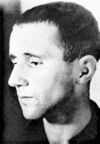- Brecht, Bertolt
- ► (1898-1956) Poeta y dramaturgo alemán. Puso sus obras teatrales al servicio de un ideario político de carácter socialista. Inició su producción teatral con La boda de los pequeños burgueses (1921) y La redada (1921). En esta primera etapa estuvo muy vinculado al expresionismo y a un difuso anarquismo en obras como Baal (1923) y Tambores en la noche (1923). En 1928 obtuvo un gran éxito con La ópera de tres peniques. Otras obras suyas son Madre Coraje (1941) y La buena persona de Sezuan (1943).
* * *
orig. Eugen Berthold Friedrich Brecht(10 feb. 1898, Augsburgo, Alemania–14 ago. 1956, Berlín oriental, Alemania Oriental).Poeta, dramaturgo y director de teatro alemán. Estudió medicina en Munich (1917–21) antes de escribir sus primeras obras, como Baal (1922). Le siguieron otras, como Un hombre es un hombre (1926), así como una considerable colección de poesía. Junto con el compositor Kurt Weill escribió el drama satírico musical La ópera de tres centavos (1928, película 1931), que tuvo una amplia aceptación, y la ópera teatral Ascensión y caída de la ciudad de Mahagonny (1930). Durante estos años abrazó el marxismo y desarrolló su teoría del teatro épico. Con la llegada al poder del nazismo se exilió, primero a Escandinavia (1933–41), luego a EE.UU., donde escribió sus ensayos más importantes y las obras Madre Coraje y sus hijos (1941), La vida de Galileo Galilei (1943), El alma buena de Se-Chuan (1943) y El círculo de tiza caucasiano (1948). Acosado por sus ideas políticas, retornó a Alemania Oriental en 1949, donde fundó la compañía de teatro Berliner Ensemble con la cual representó sus propias obras, entre ellas La resistible ascensión de Arturo Ui (1957). Esbozó su teoría del drama en Breviario de estética teatral (1949). Bertolt Brecht, 1931.Ullstein Bilderdienst
Bertolt Brecht, 1931.Ullstein Bilderdienst
Enciclopedia Universal. 2012.
